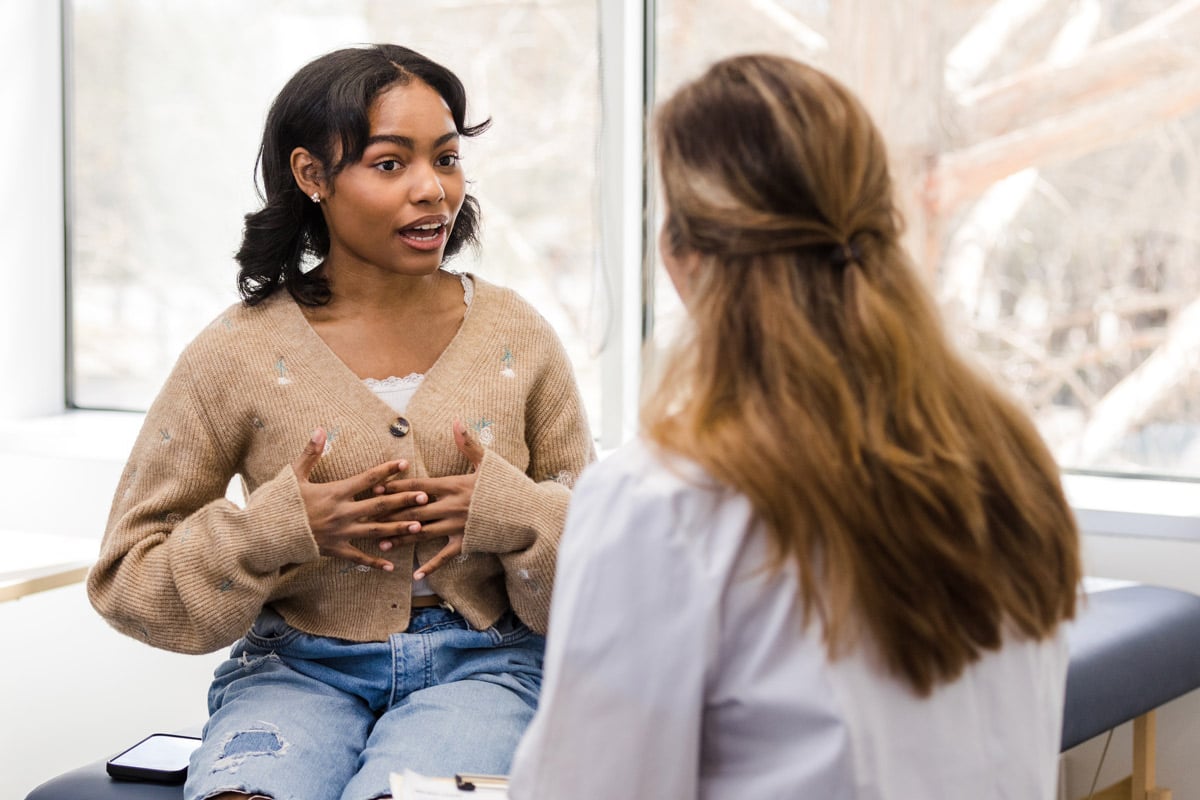Your teenage years can be a confusing time. As your body changes and you experience new things, you may have questions about your body. You may feel embarrassed or uncomfortable talking to your parents about the changes you are going through.
Moreland’s team of OB-GYN physicians can help comfort teen patients and address any questions or concerns they may have about their health.
Girls between 15 and 16 are recommended to get their first annual adolescent gynecological appointment. Having a confidential relationship with a medical professional educates adolescents about their reproductive health and empowers them to make educated choices.
A visit with an OBGYN physician can address various topics such as vaginal itching or odors, contraceptive services, menstrual abnormalities, and ensure overall reproductive health and well-being.
Below are excellent resources for information.
Adolescent gynecology addresses female adolescents' reproductive health and gynecological care, typically starting at ages 10 or 11 up to 21. Moreland is proud to offer gynecology services that cover a variety of needs and concerns, such as:
 Menstrual Irregularities: One of the most common concerns among adolescent girls is irregular periods. Young girls' menstrual cycles may not have settled into a pattern yet, and they can experience several issues with their periods, like heavy bleeding, infrequent periods, extreme pain during menstruation, or missing their period altogether.
Menstrual Irregularities: One of the most common concerns among adolescent girls is irregular periods. Young girls' menstrual cycles may not have settled into a pattern yet, and they can experience several issues with their periods, like heavy bleeding, infrequent periods, extreme pain during menstruation, or missing their period altogether.Learn about the different uses of birth control other than pregnancy prevention in this blog post!
 Pelvic Pain: Pelvic pain is a sharp or dull pain in the lower abdomen. Pelvic pain can range from mild to severe and can feel like cramps, a stabbing or shooting pain, or a dull ache. There are several possible causes of pelvic pain, such as mittelschmerz, ovarian cysts, or pelvic inflammatory disease (PID). Treatment ranges from over-the-counter medications, doctor-prescribed antibiotics, and, in some cases, specialty referrals or surgery.
Pelvic Pain: Pelvic pain is a sharp or dull pain in the lower abdomen. Pelvic pain can range from mild to severe and can feel like cramps, a stabbing or shooting pain, or a dull ache. There are several possible causes of pelvic pain, such as mittelschmerz, ovarian cysts, or pelvic inflammatory disease (PID). Treatment ranges from over-the-counter medications, doctor-prescribed antibiotics, and, in some cases, specialty referrals or surgery.
At Moreland, we believe in collaborative care and shared decision-making with all patients, including adolescents. We understand the importance of assessing each person’s unique needs and preferences and use this to tailor a healthcare plan for each person.
Our goal is for all patients to feel safe, comfortable, and respected during their visit. You should be able to discuss any questions, fears, and goals with your healthcare provider. By providing facts and information to our patients, we empower adolescents to make educated choices about their bodies and reproductive health.
Parents are always welcome to support their children during their Moreland visit, but we also understand some patients prefer privacy without their parents in the room. We will always uphold patient confidentiality, and anything discussed during your health care visit is confidential unless the patient is a danger to themselves or others and unable to make decisions independently. We also encourage open family communication and being able to discuss important topics between parents and their adolescents.
If your child is entering their adolescent years and you have questions about how to provide guidance about their health and bodies, many resources are available online. You can always consult a Moreland healthcare provider with questions you have.

Moreland OB-GYN is proud to be a leading women’s healthcare provider, serving outstanding care at our fourteen locations across southeastern Wisconsin. Our team of caring providers work with every patient to deliver compassionate patient care focused on shared decision making and an exceptional patient experience.
For compassionate gynecological care for adolescents, call Moreland OB-GYN at 262-544-4411 or request an appointment on the website. We hope you contact us today!
Note: Starting at age 14, patients can call and schedule their own appointment; however, scheduling does inform them their insurance information is needed and will be billed to the parent’s insurance.
Patients can be prescribed birth control by providers without parental permission; this includes IUDs and Nexplanons, and the doctor may not release any of the above information to a parent without the minor’s permission. Sterilization and abortion procedures require parental consent under the age of 18. For more information on minor rights in Wisconsin, click here.
Phone: 262-544-4411
Fax: 262-650-3856
Monday-Thursday:
7:30 am – 6:00 pm
Friday:
7:30 am – 4:00 pm



